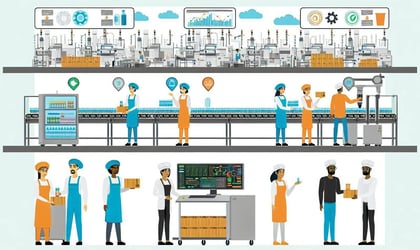Digital Supply Chain Management
In food and beverage manufacturing, staying competitive requires more than just high-quality products—it demands efficient supply chain management. The traditional methods of managing supply chains are no longer sufficient to meet the demands of today's consumers and the complexities of global markets. Enter digital supply chain management (DSCM), a transformative approach that leverages technology to streamline operations, enhance visibility, and drive strategic decision-making.
As a Supply Chain Manager in a Food and Beverage manufacturing facility, you're tasked with ensuring the seamless flow of goods from raw materials to finished products while optimizing costs and maintaining quality standards.
In this blog, we'll explore how embracing DSCM, coupled with integration between PlanetTogether and leading ERP, SCM, and MES systems like SAP, Oracle, Microsoft, Kinaxis, and Aveva, can revolutionize your supply chain operations.

Digital Supply Chain Management
At its core, DSCM harnesses the power of digital technologies such as artificial intelligence, machine learning, Internet of Things (IoT), and advanced analytics to drive efficiency and agility across the supply chain. Unlike traditional supply chain management, which often relies on manual processes and siloed data, DSCM provides real-time insights and end-to-end visibility, enabling proactive decision-making and rapid response to disruptions.

Key Benefits of DSCM in Food and Beverage Manufacturing
Enhanced Visibility: With DSCM, Supply Chain Managers gain unprecedented visibility into every stage of the supply chain, from procurement to distribution. Real-time data analytics allow for the monitoring of inventory levels, production progress, and transportation status, enabling timely adjustments to meet changing demand patterns and mitigate risks.
Improved Forecasting and Demand Planning: Leveraging advanced forecasting algorithms and predictive analytics, DSCM empowers Supply Chain Managers to accurately forecast demand, optimize inventory levels, and align production schedules accordingly. By anticipating customer needs and market trends, companies can minimize stockouts, reduce excess inventory, and maximize revenue.
Optimal Resource Allocation: DSCM enables efficient allocation of resources, including raw materials, labor, and equipment, to optimize production schedules and minimize bottlenecks. By synchronizing production with demand and minimizing idle capacity, manufacturers can enhance operational efficiency and reduce costs.
Proactive Risk Management: In today's volatile business environment, Supply Chain Managers must be prepared to mitigate various risks, including supply chain disruptions, quality issues, and regulatory compliance. DSCM provides predictive risk analytics and scenario modeling capabilities, allowing companies to identify potential threats and develop proactive mitigation strategies.

Integration with Leading ERP, SCM, and MES Systems
One of the key enablers of DSCM is seamless integration with enterprise resource planning (ERP), supply chain management (SCM), and manufacturing execution systems (MES). By integrating DSCM platforms like PlanetTogether with leading systems such as SAP, Oracle, Microsoft Dynamics, Kinaxis RapidResponse, and Aveva MES, companies can unlock synergies and streamline data flows across the organization.
SAP Integration: SAP offers a comprehensive suite of ERP and SCM solutions tailored for the food and beverage industry. By integrating PlanetTogether with SAP's ERP Central Component (ECC) or SAP S/4HANA, companies can synchronize production planning, inventory management, and procurement processes in real time, leading to improved efficiency and accuracy.
Oracle Integration: Oracle provides a range of cloud-based SCM solutions designed to optimize supply chain operations. By integrating PlanetTogether with Oracle SCM Cloud, companies can achieve end-to-end visibility and orchestrate seamless collaboration with suppliers, distributors, and partners, enabling faster decision-making and better customer service.
Microsoft Dynamics Integration: Microsoft Dynamics offers a flexible and scalable ERP platform that can be tailored to the unique needs of food and beverage manufacturers. By integrating PlanetTogether with Microsoft Dynamics 365 Supply Chain Management, companies can leverage advanced analytics and AI-driven insights to optimize production scheduling, inventory optimization, and demand forecasting.
Kinaxis Integration: Kinaxis RapidResponse is a leading SCM platform known for its real-time planning and collaboration capabilities. By integrating PlanetTogether with Kinaxis RapidResponse, companies can achieve a unified view of the supply chain and synchronize planning processes across multiple tiers, enabling faster response to market changes and supply chain disruptions.
Aveva Integration: Aveva MES offers manufacturing execution solutions that enable real-time visibility and control over production operations. By integrating PlanetTogether with Aveva MES, companies can optimize production scheduling, track performance metrics, and enforce quality standards, leading to improved efficiency and product quality.
Best Practices for Successful Integration
While integrating DSCM with ERP, SCM, and MES systems offers numerous benefits, it's essential to follow best practices to ensure a smooth implementation and maximize value:
Define clear objectives and KPIs: Before embarking on integration, clearly define your objectives and key performance indicators (KPIs) to measure success. Whether it's improving lead times, reducing inventory costs, or enhancing customer satisfaction, align integration efforts with strategic goals.
Engage stakeholders: Involve key stakeholders from across the organization, including IT, operations, finance, and procurement, in the integration process. Collaborate closely to understand business requirements, identify integration points, and ensure alignment with existing processes.
Leverage pre-built connectors and APIs: Many DSCM and ERP/SCM/MES vendors offer pre-built connectors and application programming interfaces (APIs) that facilitate seamless integration. Leverage these tools to streamline data exchange and minimize development efforts.
Ensure data integrity and security: Data integrity and security are paramount when integrating systems that handle sensitive information. Implement robust data validation mechanisms, encryption protocols, and access controls to safeguard against unauthorized access and data breaches.
Provide training and support: Offer comprehensive training and support to end-users to ensure they understand how to effectively use the integrated systems. Provide ongoing guidance and troubleshooting assistance to address any issues and maximize user adoption.
Digital supply chain management represents a paradigm shift in how food and beverage manufacturers optimize their supply chain operations. By embracing DSCM and integrating with leading ERP, SCM, and MES systems, companies can unlock new levels of efficiency, visibility, and agility, enabling them to stay ahead of the curve in today's fast-paced business environment.
As a Supply Chain Manager, embracing DSCM and leveraging integration capabilities will not only drive operational excellence but also position your organization for sustained growth and success in the years to come. Embrace the digital revolution, and unlock the full potential of your supply chain!
Remember, the journey towards digital transformation may be complex, but the rewards are well worth the effort. Stay informed, stay proactive, and embrace the power of digital supply chain management to revolutionize your operations and drive lasting value.
Are you ready to take your manufacturing operations to the next level? Contact us today to learn more about how PlanetTogether can help you achieve your goals and drive success in your industry.
Topics: PlanetTogether Software, Improved Efficiency and Accuracy, Optimal Resource Allocation, Integrating PlanetTogether, Improved Forecasting and Demand Planning, Enhanced Visibility, Improved Product Quality, Food and Beverage Manufacturing, Digital Supply Chain Management




















LEAVE A COMMENT